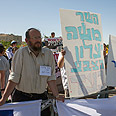

Prime Minister Benjamin Netanyahu presented the cabinet with the principles for his plan to evict the residents of the Ulpana neighborhood, in the Beit El settlement.
Netanyahu's plan, which entails moving the houses in question to a nearby military zone, is still pending Attorney General Yehuda Weinstein's approval.
Related Stories:
- Barak: Beit El has alternative land for Ulpana
- Ulpana evictees to be resettled in caravillas
PM freezes bill circumventing High Court
Netanyahu reiterated his objection to the possibility of regulating the settlement's statue through legislation, saying that "that solution exists, but it comes with a price, including one in the international area."
The prime minister's plan included three stages: The first stage entails relocating the disputed homes and moving them several hundreds yards away, which will cost the State less than estimated. The operation's initial costs were estimated in "tens of millions of shekels."

Protesting the plan (Photo: Ohad Zwigenberg)
The second stage includes reinforcing the settlement movement by building 10 housing units for every house moved. The move will afford Beit El to add over 1,000 residents to its rank.
"This is a crucial element against those who wish to raze (homes). I'm waiting for the AG's answer on that," Netanyahu said.
The third stage entails deterring future petitions by having the State battle any legal motion presented on the issue.
"This plan addresses the residents' needs, the legal questions, Beit El's needs and any attempt to use the law inappropriately," Netanyahu said.
'Eviction will have severe ramifications'
Dozens of settlers and rightist activists protested Sunday in front of the Prime Minister's Office against the plan.
MK Zeev Elkin, chairman of the Likud faction, warned of a crisis in the Coalition should Netanyahu insists on pursuing his plan. "This will be a traumatic event and it will have severe ramifications on the political arena," he said.
According to estimates, the bill that hopes to legalize West Bank settlements retroactively will be approved only if ministers, not only MK's, would be allowed to vote according to their conscience. Protesters called on the ministers to vote in favor of the bill, even if it costs them their cabinet seat.
"I reject and oppose the evacuation of the neighborhood," Mk Zvulun Orlev, who together with the PM formulated the plan, said. "My bill offers a solution not just to five Ulpana houses but to 9,000 houses in similar situations in many other settlements, including Assaf and Amona."
The IDF expressed concern over unrest on the ground should the plan be realized.
A senior IDF officer said that "there's no doubt that this kind of evacuation can set the situation on the ground on fire. We are preparing for such an event, but it consumes many resources."
- Receive Ynetnews updates
directly to your desktop















